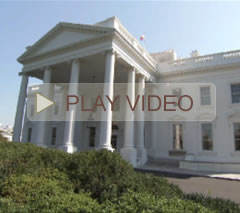

The White House Copy of the Gettysburg Address
The document on display is the last known draft of the Gettysburg Address written in Lincoln's hand. President Abraham Lincoln wrote these remarks for the dedication of the Soldiers National Cemetery on November 19, 1863. He produced this copy in March 1864 to help raise funds for the Union cause. The manuscript, often referred to as the Bliss copy, was kept by Alexander Bliss, one of the book's publishers. It remained in his family until it was auctioned in 1949. Oscar Cintas, a former Cuban ambassador to Washington, purchased the document for $54,000—then a record price paid for a document at public auction. Cintas, who died in 1957, left the address to the people of the United States with the understanding that it be placed in the White House's collections.
Video: Step inside the Lincoln Bedroom. Courtesy of C-SPAN.
View the transcript (.pdf).
The Lincoln Bedroom
The White House copy on display in the Albert H. Small Documents gallery (Nov. 21, 2008 to Jan. 4, 2009 at the National Museum of American History) is normally kept on view in the newly restored Lincoln Bedroom on the second floor of the White House.
The room, which had been President Lincoln’s office and cabinet room, has been called the Lincoln Bedroom since 1945 when President Harry S. Truman directed that Lincoln-era bedroom furnishings be placed there.
Under the leadership of Mrs. Laura Bush, the White House completed refurbishing the Lincoln Bedroom and adjoining sitting room in 2005.
Transcription of the Gettysburg Address
Address delivered at the dedication of the Cemetery at Gettysburg.
Four score and seven years ago our fathers brought forth on this continent, a new nation, conceived in Liberty, and dedicated to the proposition that all men are created equal.
Now we are engaged in a great civil war, testing whether that nation, or any nation so conceived and so dedicated, can long endure. We are met on a great battle field of that war. We have come to dedicate a portion of that field, as a final resting place for those who here gave their lives that that nation might live. It is altogether fitting and proper that we should do this.
But, in a larger sense, we can not dedicate—we can not consecrate—we can not hallow—this ground. The brave men, living and dead, who struggled here, have consecrated it, far above our poor power to add or detract. The world will little note, nor long remember what we say here, but it can never forget what they did here. It is for us the living, rather, to be dedicated here to the unfinished work which they who fought here have thus far so nobly advanced. It is rather for us to be here dedicated to the great task remaining before us—that from these honored dead we take increased devotion to that cause for which they gave the last full measure of devotion—that we here highly resolve that these dead shall not have died in vain—that this nation, under God, shall have a new birth of freedom—and that government of the people, by the people, for the people, shall not perish from the earth.
Abraham Lincoln.
November 19, 1863.
